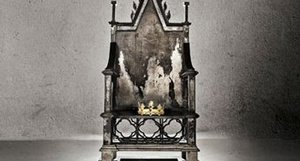RSC Production of 'Henry V'
Henry V, part of the 'King and Country' series, produced by
the Royal Shakespeare Company
17 January 2016, at the Barbican Centre, London
Review by Amy Lidster, PhD Candidate, Department of English

The 'King and Country' series by the RSC
Gregory Doran’s RSC production of Henry V, part of the King & Country cycle, achieves something significant: it manages to distinguish itself from the myriad of recent productions of the play. By heightening its metatheatrical aspects and inventively utilising the audience, the production offers a captivating presentation of a less assured Henry, subsumed within the processes of writing and re-writing history.
One of the real strengths of this production is Oliver Ford Davies’ Chorus. Dressed in contemporary clothes and flourishing a patriotic red scarf, Davies acts as a modern commentator on the events of Henry V’s reign, energetically playing up the elevated ebullience of the Choruses that celebrate Henry’s famous victories. This positioning is in sharp contrast with the battle scenes, and Doran’s production heightens the tension between reported event and dramatised action by splitting some of the Choruses, highlighting this incongruity through intensified juxtaposition.
Adding to this tension, the division between the Choruses and the action is regularly blurred, with the actors repeatedly interrupting each other. As Davies delivers the Chorus to Act 3, an explosion from the siege at Harfleur intrudes, and in Act 2, trumpets and soldiers invade the stage and halt the Chorus twice before its conclusion. While prompting laughter from the audience, these intrusions and conflicts between report and action draw attention to the competing versions of ‘history’ that fade beneath the dominance and smoothness of national narratives, represented by the Chorus. In Act 4, as Davies praises Henry’s ability to provide comfort to his troops on the eve of battle, Alex Hassell’s sombre, shifting presence in the shadows of the stage highlights the disparity between Davies’ ‘remembrance’ of the past and the events as they are dramatised on stage, pointing to the ways in which the writing of history is partial and belated, characterised by the selective refashioning of events.
Intensifying this friction, Hassell’s Henry is a much less confident and galvanising leader than most productions tend to offer. Hassell delivers the famous (and frequently stirring) ‘Once more unto the breach’ monologue as a soliloquy, appropriating the audience as his soldiers. But with the emptied stage and the audience spatially removed from the action and plunged in darkness, Henry’s ‘army’ seems potentially uncooperative, and the isolated figure of Henry on the stage appears to struggle in eliciting motivation for the siege. A mere two scenes later, Hassell again addresses the audience as the actors in his history, but with a very different effect: here we are uncomfortably addressed as the citizens of Harfleur and experience the brutality of Henry’s threats, compellingly drawing attention to the situation of the conquered silently underlying the Chorus’s narrative of celebration and national achievement.
Frequently, productions of the play present Henry as more complicit in these processes of shaping and reconfiguration, but in Doran’s production, there is a pronounced tension between King and Chorus, humorously introduced within the first few lines, as Hassell pushes onto the stage and snatches his crown from Davies’ hands, a significant gesture suggesting Henry’s attempt to retrieve his own history. Elsewhere, the production emphasises the comic aspects of the play, most notably with the four captains and the scenes involving Katherine, but the serious implications of the play’s military action are continually invoked. Coinciding with the 600th anniversary of the Battle of Agincourt, this production offers an uneasy interplay between reported ‘history’ and dramatised action, questioning those familiar and victorious narratives.
Following the Barbican season, Henry IV Parts I & II and Henry V tour to China and are then re-joined by Richard II in Spring 2016 for an exclusive season in New York, at the Brooklyn Academy of Music (BAM).

